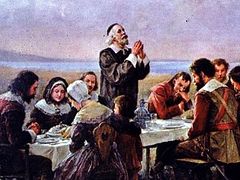Thanksgiving 2020… We have so much to be thankful for. For life, for our families and friends, for the food on our tables. The vicissitudes of a difficult year are nothing in comparison with all the blessings God gives us. We have learned to appreciate our churches, divine services, and the clergy and members of our church communities more than ever, because we never know when all of this can be taken away from us.
Today we doubly celebrate Thanksgiving and the saint who spoke those famous words in his own time of trial, “Glory to God for all things”—Holy Hierarch John Chrysostom.
 St. John Chrysostom St. John Chrysostom writes: “Faith is the portion of the grateful.” Gratitude is a talent, a special gift… An ungrateful person cannot be a Christian, just as an ungrateful Christian does not deserve the name. This gift can strike a person unexpectedly, and as if having his eyes suddenly opened he begins to see things that he never saw before.
St. John Chrysostom St. John Chrysostom writes: “Faith is the portion of the grateful.” Gratitude is a talent, a special gift… An ungrateful person cannot be a Christian, just as an ungrateful Christian does not deserve the name. This gift can strike a person unexpectedly, and as if having his eyes suddenly opened he begins to see things that he never saw before.
Gratitude is the portion of the humble. The proud man cannot be grateful, because it seems to him that he deserves only admiration for his personal merits. Gratitude brings people spiritually closer together, and removes mistrust and suspicion.
Gratitude is a special relationship between God and the world, a true state of openness. Through gratitude, alienation disappears. A grateful person is open to others.
To accept with gratitude all that the Lord gives us—that is our Christian labor, or podvig and our mission.
Sincere thanksgiving in prayer is inalienable from joy. Unfortunately, man is fickle, and his consciousness is often eclipsed by vanity and everyday cares.
Gratitude is man’s special relationship to God and the world, a true state of openness.
The apostle Pavel in his famous hymn on love convinces us that love is the miracle of miracles. Love is impossible, absolutely impossible if we do not see it as it is—a gift of God. Only the grateful person is capable of true joy. And on the contrary, if there no such joy in life, it means that the reason for it is our inability to be grateful, our insensitivity to the love of Another.
Joy of life
St. Gregory the Theologian writes: “We received our existence that we might prosper.” In other words, we live in order to live and receive joy from living.
The Lord created man so that he would receive joy from what he does.
What is the maximal opposite of life—death—was conquered by Christ’s Resurrection.
The joy of Pascha is the joy of a restored, healed, and whole person; the joy of immortality—immortality of the whole person, and that would mean of the whole body. And joy is connected with gratitude.
God calls us through the lips of the apostle Paul: Rejoice evermore. Pray without ceasing. In every thing give thanks: for this is the will of God in Christ Jesus concerning you (1 Thess. 5:16–18).
The apostle exhorts us to give thanks not only for the good, but for everything, both good and evil. That is how St. John Chrysostom was able to give thanks. Despite the fact that he suffered cruelly from injustice, and spent the final years of his life in harsh exile, his last words on his deathbed were: “Glory to God for all things.”
And Holy Hieromartyr Arseny (Matsevich), Metropolitan of Rostov, who was unjustly condemned by Empress Catherine II to life imprisonment for opposing her politics of secularization (the confiscation of church and monastery lands to the benefit of the government treasury), left an inscription on the wall of his lonely prison cell: “It is good for me that Thou hast humbled me.”
Whoever has learned to be thankful even in sorrows is truly “not far from the Kingdom of Heaven.”
Gratitude gives a feeling of satisfaction to those who are thanked. After all, that person sees and understands that his labors are not in vain but needed and deservedly appreciated. At the same time, gratitude has a beneficial influence on those who thank, because it brings peace, harmony, and other positive feelings.
Thankfulness to God
We are obliged to God for everything: our life and all its good things, for God’s providence for us, for innumerable mercies, and longsuffering over our sins, passions, lusts, slothfulness, and weaknesses.
And we must first and foremost be thankful to God, without Whom we can do nothing, and only then to man—as His creation.
All good things that we have are sent to us by God, as the apostle James says: Every good gift and every perfect gift is from above, and cometh down from the Father of lights (Js. 1:17).
The Lord gives us everything—existence, life, breath, and light. He gave us eyes to see, ears to hear, legs to walk, arms and hands to work, and a head to think. He feeds us, clothes us, protects us and cares for us. Our home, our possessions, our material wealth are all gifts of God.
The holy fathers talk about it this way: “If you have done something without the participation of your body, it belongs to you. If you have done something with the help of your body, then you should remember that your body is God’s creation. And if you thought something without a mind, then it’s yours. But if your mind did the thinking, then know that your mind is also God’s creation.”
From these words it is clearly seen that not even what we supposedly acquired, earned, or created ourselves belongs to us. Even less so do those things we cannot create belong to us—for example our beloved family and friends, our body, our soul, our health, our talents and abilities. All of these things are none other than God’s great gifts.
And for all of this we are obligated to ceaselessly give thanks and remember our Lord.
We must thank God For all of this, for we often judge things that do not fit into our understanding. We judge people who have had things happen to them, forgetting that if that is what happened, it means we must humble ourselves and thank God for everything.
If a person sincerely prays but does not receive his request, it means that the Lord is preparing something greater and better than what he asked for. Standing in prayer, as St. Basil the Great teaches us, we should first give glory to God and then thank Him, repent, and only after all this ask for something; although usually a person according to his own level of spiritual maturity moves from requesting and repenting to thanksgiving and glorifying…
As Fr. Alexander Elchaninov writes: “The virtue of gratitude, like all of our other virtues, like the podvigs of fasting and prayer, are needed first of all by us ourselves. That we have the feeling of gratitude testifies that living in us is an undoubting faith and love for God. Our gratitude is our certificate of a correctly ordered religious soul. We all know how to ask. Even unbelievers can sometimes run to God in moments of extreme need. But we don’t know how to thank. Prayers of thanksgiving are the sign of a soul raised high. It is good to remember God in our misfortunes; but to not forget Him in our joys is the sign of a soul that is confirmed in God. Prayers of request can live comfortably in the heart along with our egoism, pride, and anger. But prayers of thanksgiving are incompatible with such feelings. Let us run to God in our misfortunes and circumstances, but not neglect to climb to a higher step—prayers of thanksgiving.”
Gratitude to God raises us mortals from the decay of death, frees us from attachment to what we definitely shall be separated from whether we like it or not, and turns us to God.
Gratitude ennobles the one who thanks, and moves the benefactor.
“No matter which way the eyes of my heart look,” writes St. John of Kronstadt, “inwardly or outside myself, everywhere I see a strong cause for gratitude and glory to God!”
In moments of trial, many lose heart and complain. But we have to understand that the Lord sometimes allows unpleasant and sorrowful things to happen to us not because He has forgotten us or wants to punish us. No! He allows them as bitter but necessary medicine that cures us of pride, light-mindedness, conceit, selfishness, and other inadequacies.
We must thank the Lord that our faith gives us the spiritual reasoning to understand events around us, to correctly assess them and learn from them; we must understand that natural and social disasters are sent by the Lord mainly in order to shake mankind out of its sinful indifference, to waken us from spiritual slumber, remind us that we will not live forever on this earth and that another life awaits us.




